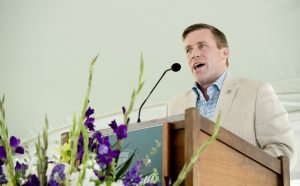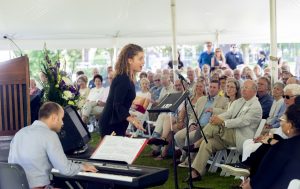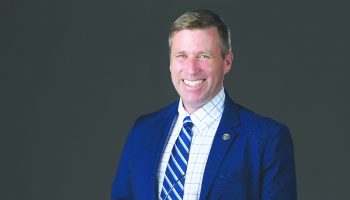
Bestor Society members gathered on Sunday, Aug. 4 on the Arts Quad for the annual President’s Address. The occasion was for Bestor Society members to be recognized for their philanthropic generosity, providing them with an opportunity to hear from Chautauqua Institution President Michael E. Hill.
Members were welcomed with hors d’oeuvres and live music from a string trio. The event began with an introduction from Jim Pardo, chair of the board of trustees and emcee for the evening.
“This is one of those events that I enjoy more than nearly any other, and I appreciate each of you taking the time to be here to celebrate with us at Chautauqua and to allow us to greet you,” Pardo said.
Pardo thanked Bestor Society members for their generosity toward Chautauqua and emphasized that without philanthropy, the Institution would not be what it is now. Comprised of those who donate $5,000 or more to the annual Chautauqua Fund, the Bestor Society plays an important role in keeping Chautauqua at its best and supporting the community.
“It’s interesting to come to this group every year and to represent the Institution and to say thank you in a genuine manner for the philanthropic support that each of you provide to the Institution,” Pardo said. “But if not for philanthropy, this place doesn’t open. I can’t thank you enough on behalf of the Institution for your generosity. It is not the margin of difference, it is the difference, … and for that I am genuinely appreciative.”
Padro then introduced Tim Renjilian, co-chair of the 2019 Chautauqua Fund with his wife, Leslie Renjilian, to acknowledge the new Bestor Society members and welcome them to the leadership community of supporters.
“I hope that when you look out at this group, you get the same feeling as I do: a feeling of reassurance and inspiration that plays out on multiple levels,” Renjilian said. “I feel inspired by all of you.”
Renjilian said that reassurance is needed; America has suffered from a total of 248 mass shootings in 2019. He said that Chautauqua is a community needed during times like these.
“For the only antidote to loneliness, close-mindedness, hopelessness and to hate, is the only one that we’ve ever had — is in communities like this,” Renjilian said, “communities comprised of people willing to show up, to expose themselves to new ideas and experiences, and to contribute their energies and resources to enrich the community for the benefit of others. That’s who you all are.”
He said that Bestor Society members inspire greatness in the Chautauqua community by supporting the Institution and providing financial donations to help further Chautauqua’s mission.
“You’re people who used your resources to make a major financial contribution, in effect putting down a marker to say Chautauqua is important, it’s part of who we are and it warrants our commitment and our sacrifice,” Renjilian said. “So thank you, fellow Chautauquans, members of the Bestor Society, not only for your gifts to further the life of this Institution, but for being a much-needed source for reassurance and inspiration.”
Deborah Sunya Moore, vice president of performing and visual arts, then approached the stage to introduce a musical selection for the evening. Moore also offered her personal thanks to the audience for their support of Chautauqua’s performing and visual arts programming.

“I just wanted to start by adding my thanks to many people involved and many programs for what you do,” Moore said. “We are grateful for it, and we also hope that the inspiration we offer on a regular basis here at Chautauqua makes you proud of what you do, and re-inspires you in everything that Chautauqua stands for.”
Moore introduced the young artists who performed at the address: School of Music Voice Program students Lucy Evans and Amani Cole-Felder. This is the first year for each to attend Chautauqua’s Voice Program, and both have sung in master classes this summer. Evans attends Northwestern University Bienen School of Music, and Cole-Felder graduated with her master’s degree from the New England Conservatory of Music. They were accompanied on keyboard by Travis Bloom, a music coach at Chautauqua.
After the performance, Pardo welcomed Hill to the stage for his annual address to the Bestor Society. Hill started by explaining how he enjoys participating in the weekly theme construction and development at the Institution, in order to curate a season that stimulates conversations and the minds of Chautauquans.
“Every year we consider dozens of themes, and we’re always challenging ourselves to find the right combination of topics to reflect what we’re seeing in the world,” Hill said.
Hill names one topic each year as a “presidential prerogative” because he believes, in addition to historical data and the science of market-testing themes, it’s important for intuition to play a role in decision making. He said the presidential prerogative week this season was Week Seven.
“We’ll explore grace, a celebration of extraordinary gifts,” Hill said. “I mention this because it is particularly fitting for this celebration of our Bestor Society members to occur today as we launch our exploration of grace.”
Hill then emphasized that there were three expressions of grace, three extraordinary gifts, that he wished to celebrate with Bestor Society members.
“First, I want to thank Jim Pardo for the extraordinary gift of his leadership as the chair of our board of trustees for the past six years, and for his 15 years of service as a trustee and community representative for Chautauqua,” Hill said.
Hill said that Pardo has given his best to Chautauqua and that he is deeply grateful for his efforts and the impact he has made at the Institution.
“Second, we spent the entire summer reflecting on our recently passed strategic plan, so I’ve been thinking a lot about the gift that is Chautauqua — its history, its present life and its future,” Hill said. “During the planning process, one of the things that we tried to do was to better define Chautauqua and to discuss its competitive advantage or distinction in the marketplace of ideas.”
Hill said there are, in fact, many ways the Institution differs from organizations or platforms for exchanging ideas, such as the Aspen Ideas Festival or TED Talks. While TED Talks are limited to 5 to 18 minutes, Chautauqua provides lectures and programs that thoroughly dissect a topic or issue. Chautauqua programs and events provide ample time to truly dive into conversation and reflect at the end of that conversation. At the end of lectures, Chautauquans are given the opportunity to ask questions and sometimes meet lecturers afterwards.
Hill said that TED Talks often “open with a joke, ensure a spontaneous moment, create a statement of utter certainty, create a snappy refrain and repeat it relentlessly, cite a personal failure or struggle and sigh when you’re doing it and create a contrarian thesis and stick to it until you hit the 15-minute mark.”
“Aspen’s approach to its summer ideas festival is similar, and we really respect them,” Hill said. “There are some years when their speakers mirror our speakers, but Aspen is unapologetic about who they are trying to reach: the elite, the wealthy and only the huge names on the lecture circuit, and there’s nothing wrong with that.”
That model works for Aspen because they are endeavoring to fund a lot of leadership development programs, in which Hill himself has participated, and they do that by making sure their brand makes headlines — which requires a lot of money.
“As I thought about what makes Chautauqua different from these and other fine thought leadership organizations, I found myself full of gratitude for the answer,” Hill said. “At Chautauqua, we host some of the world’s most critical conversations and as such, we know that they can’t fit into a soundbite or even 15 minutes.”
Every time someone tells Hill that Chautauqua should be more like TED Talks, he said that he bristles because he has faith in the young and the young at heart who want to come to Chautauqua and try to find all of the answers.
“We will not seek to reduce complexity to a soundbite,” Hill said. “Every year we endeavor to find the most pressing topics.”
Hill emphasized how these topics cannot fit into one medium and that is why Chautauqua has four pillars. He closed by explaining how Chautauqua is a place where topics are discussed in their entirety and through many lenses, including art and religion.
“It’s not enough to be enriched yourself, you have to pay it forward when you go home,” Hill said. “In a world where being brief is the coin of the realm, Chautauqua stands up to say that often truth lies in complexity, that to heal the world we have to understand it first, and no person or party can own that. And if that sounds exhausting, Chautauqua probably isn’t for you, and that’s OK. You have to want it, and I’m profoundly grateful that everyone in this room does.”
For information about the Bestor Society or leadership giving to the Chautauqua Fund, contact Tina Downey, director of the Chautauqua Fund, at 716.357.6406 or
tdowney@chq.org.


